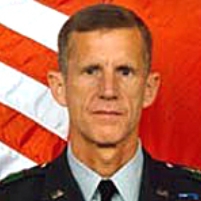Pentagon Spending Binge: Part Welfare, Part Waste
Wednesday, December 01, 2010
 Gen. Stanley McChrystal
Gen. Stanley McChrystal
If the United States stays on its present course of military spending increases, the Department of Defense’s annual budget would reach $1 trillion—that’s “t” for trillion—by 2030.
Defense Secretary Robert Gates has said the Pentagon’s ‘culture of endless money” must end, and President Barack Obama supposedly is behind Gates on this issue. And yet the DoD budget just keeps climbing like an advanced fighter aircraft, totaling about $700 billion this year.
“Adjusting for inflation, that’s more than America has spent on defense in any year since World War II—more than during the Korean war, the Vietnam war, or the Reagan military buildup,” writes Gregg Easterbrook in The New Republic, adding that military and security expenditures have soared by 119% since 2001.
Even if spending on the Iraq and Afghanistan wars is subtracted out, the defense budget has ballooned 68% since 2001.
American military spending is now almost the same amount as what the rest of the world, combined, spends on defense.
Military spending is riddled with waste, with many weapons systems going way over budget and some turning out to be obsolete by the time they are completed. However, much of the increased spending is due to the improved salaries and benefits for members of the armed forces, which account for $300 billion a year, or 43% of the total. One particular problem is the increase in the officer corps. According to Easterbrook, “Today, the United States has more four-star generals and admirals than during the Nixon administration, when there were twice as many active-duty enlisted personnel.”
This has a ripple effort when it comes to pensions. For example, General Stanley McChrystal, who was fired by President Barack Obama in June, will receive $149,700 a year for the rest of his life. He is 56 years old.
Military construction costs have also doubled in the past ten years and military health care expenses have more than doubled.
-David Wallechinsky, Noel Brinkerhoff
Waste Land (by Gregg Easterbrook, New Republic)
U.S. Accounts for 44% of World’s Military Spending (by Noel Brinkerhoff, AllGov)
Secret U.S. Military Spending Surpasses Entire Military Budget of Russia (by Noel Brinkerhoff, AllGov)
- Top Stories
- Unusual News
- Where is the Money Going?
- Controversies
- U.S. and the World
- Appointments and Resignations
- Latest News
- Musk and Trump Fire Members of Congress
- Trump Calls for Violent Street Demonstrations Against Himself
- Trump Changes Name of Republican Party
- The 2024 Election By the Numbers
- Bashar al-Assad—The Fall of a Rabid AntiSemite






Comments